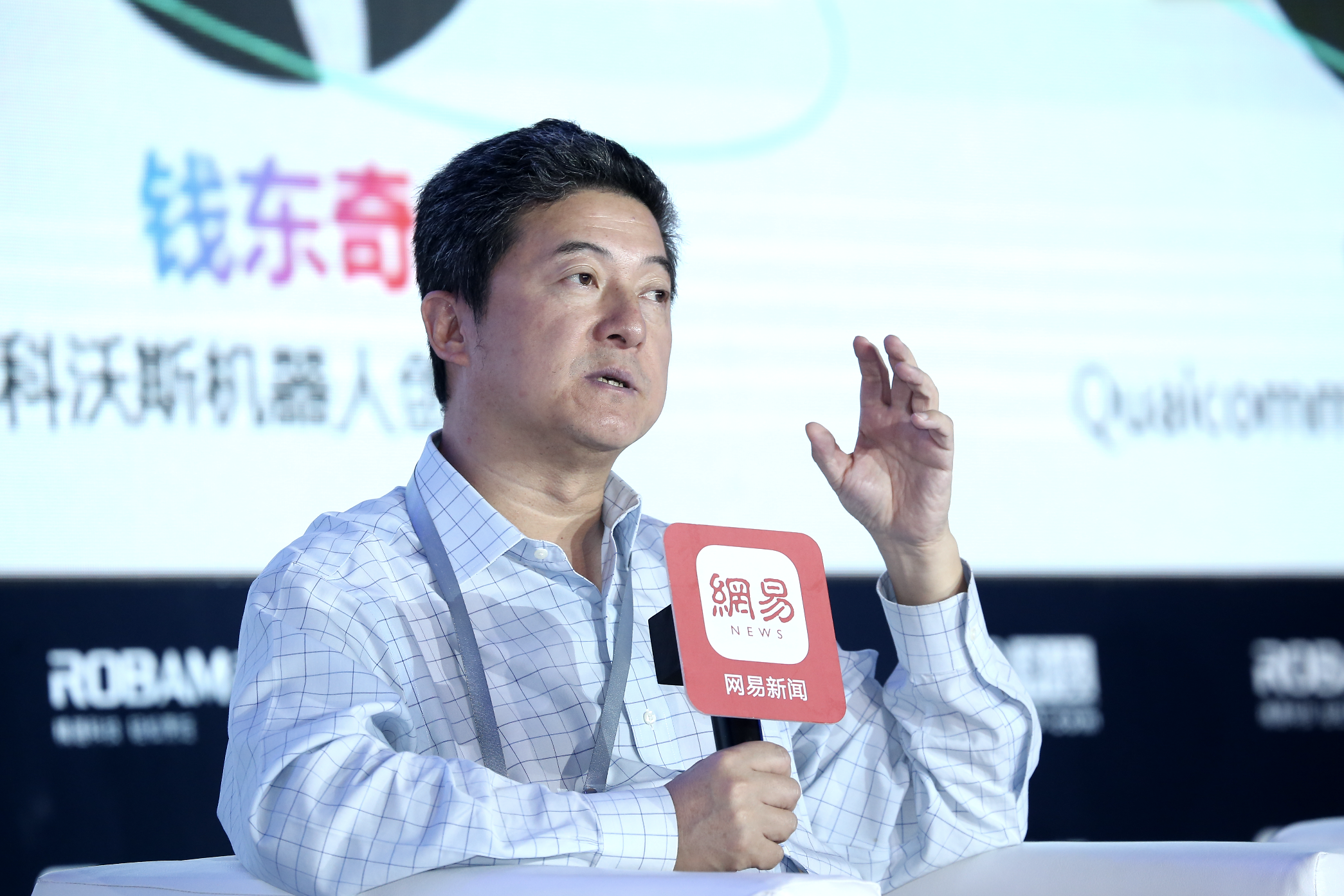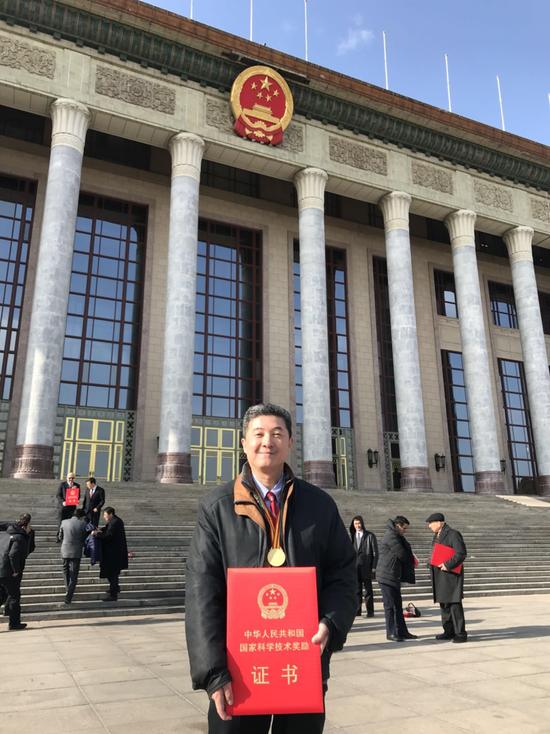
Produced | Scientists said column group
Author | Netease Technology Cui Yuxian
Who is He?
Zhang Shouyi, known as a "prodigy boy," skipped high school and studied from junior high to Fudan University. Under the guidance of Yang Zhenning, he is widely believed to be on the path to winning the Nobel Prize. He has made groundbreaking contributions in the field of topological insulators, discovering the "quantum spin Hall effect." He has received numerous prestigious awards in physics and was appointed as a professor at Stanford University, becoming one of its youngest tenured professors. In addition to his academic achievements, Zhang is also an entrepreneur who founded Danhua Capital.
Zhang Shouyi was awarded the 2017 People's Republic of China International Science and Technology Cooperation Award.
Thoughtful Quotes
1. Finding a good research topic in such a vast scientific field requires a scientist to have strategic vision, much like a helmsman navigating the sea.
2. China is increasingly focusing on science, and scientists are gaining more respect. The foundation of Chinese education is strong, and the country is investing heavily in scientific instruments, which will help experimental science develop rapidly.
3. However, many domestic experiments tend to follow trends rather than innovate. For example, if foreign researchers do N, domestic ones often do N+1 instead of exploring something entirely new (0 to 1).
4. Quantum computing is a key area with strategic importance. We have taken a brand-new approach, and the discovery of "Angel Particles" could revolutionize quantum computing, offering a breakthrough from 0 to 1.
5. A new direction we're pursuing is using artificial intelligence to predict new materials, aiming to benefit humanity through scientific progress.
6. As a scientist born in China, I always want to serve as a bridge between Chinese and international science.
Note: "Angel Particles" is the name given by Professor Zhang Shouyi to the chiral Majorana Fermion. The discovery was published in the journal *Science*, with He Qinglin as the first author, who named the particle "Tai Chi Particle."

Text
After the discovery of "Angel Particles," Zhang Shouyi and his team did not stop their research. Recently, he returned to China to receive the 2017 People's Republic of China International Science and Technology Cooperation Award at the Great Hall of the People and gave an interview with NetEase. During the interview, he discussed the significance of the award, future cooperation with Chinese scientists, and the lab’s leading research projects—quantum computing and material prediction using AI.
Quantum computing is considered the core of the next technological revolution. Tech giants like Google, IBM, Intel, Microsoft, Alibaba, and Huawei are all investing heavily in this area. The U.S. magazine *Science* once reported that tech companies have invested tens of millions of dollars in quantum computing research, each choosing different technologies.
"In the international arena, quantum computing is a highly focused research area and a strategic command point, but everyone is still in the early stages of exploration," Zhang said.
Currently, a single qubit is very fragile. To create a truly useful qubit, ten or even twenty qubits are needed for error correction, which limits scalability. "But 'Angel Particles' could bring a 0-to-1 breakthrough in quantum computing," Zhang explained.
Zhang believes that "Angel Particles" enable topological quantum computing, where a qubit can operate without errors, potentially revolutionizing the field.
When "Angel Particles" were discovered, Zhang explained that they are half of a typical particle. Traditional qubits are fragile, making them prone to errors. Angel particles split a qubit into two parts, making it extremely difficult for noise to affect both simultaneously and destroy the stored information. Compared to traditional storage methods, topological qubits on two distant Majorana fermions are inherently stable.
"Angel Particles" not only challenge existing concepts but also overturn classical ideas about opposites. They also redefine the basic quantum unit, bringing stability and practical applications to science and technology.
Zhang recently established a Topological Quantum Physics Center at Stanford and plans to set up an experimental center in China, realizing theoretical assumptions there.
In addition to quantum computing, Zhang has started a new research direction: using AI to predict new materials. Materials have shaped human history—from the Stone Age to the Silicon Age. However, most materials were discovered accidentally. Zhang believes AI can change this process, guiding experiments with theory to discover useful materials.
"Once this is done, we can not only predict inorganic materials but also organic ones, even small molecules, for precision medicine," Zhang said excitedly.
Zhang plans to bring these initiatives back to China, working closely with domestic scientists. This reflects his commitment as a Chinese-born scientist and the growing influence of Chinese science globally.
Zhang believes science should foster collaboration and hopes to bridge Chinese and global scientific communities.
This is why the country awarded him the 2017 International Science and Technology Cooperation Award.
Beyond research, Zhang also founded Danhua Capital, aligning with China's "Double Creation" initiative to establish a successful model of "production, study, and research." He aims to connect Stanford and China through this venture.
"Danhua" means bringing Stanford and China closer together," Zhang said.
Here are some highlights from NetEase's interview with Zhang:
NetEase: You just won the 2017 China National International Science and Technology Cooperation Award. What are your thoughts?
Zhang: It's a major recognition from the state. China is paying more attention to science, and this is the highest honor for foreign citizens.
China now focuses well on fixed goals, and our work in topological insulators has brought us to the global forefront. Many awards go to Chinese scientists in this field. I was part of the "Thousand-person Plan" in 2009, helping bring cutting-edge research to China.
NetEase: Why were you selected for the "Thousand-person Plan"? Was it due to topological insulators?
Zhang: Yes. Our work in topological insulators and quantum anomalous Hall effects put Chinese science on the global map.
China's future development needs scientists with strategic vision. In broad fields, finding good topics is crucial. Like a helmsman, you need direction.
We are optimistic about China. With the "Thousand-Year Plan," we can bring promising research to China. Also, students can join the "Thousand Youth Plan," rooting themselves in China for research. I believe Chinese science will continue to advance and reach the international frontier.
NetEase: Do you have new plans for cooperation with China?
Zhang: Yes, we plan to deepen collaboration. The discovery of "Angel Particles" is a big boost for quantum computing. While others are still exploring, we have a new approach. Qubits are fragile, requiring ten or twenty for error correction, limiting scalability. But with topological quantum computing, qubits can run without errors, leading to a revolutionary impact.
NetEase: How does China compare to other countries in quantum computing?
Zhang: China hasn't fully started yet. We have traditional plans, but they face scalability issues. Our work in topological insulators shows we can lead. I hope to continue close cooperation with Chinese scientists.
NetEase: So this is a major direction for future cooperation?
Zhang: Yes. I've established the Center for Topological Quantum Physics at Stanford and plan to set up an experimental center in China, realizing our theories here.
NetEase: Will there be university collaborations?
Zhang: Yes. While U.S. companies are researching quantum computing, it's rare. Google, Microsoft, and IBM are also involved, showing its strategic importance. We have proposed a new principle, which we believe will become the most successful path, though it requires experimentation.
China has invested heavily in scientific instruments, so as a theoretical physicist, I need advanced equipment.
NetEase: Where is China in the global quantum computing race?
Zhang: Everyone is still in the early stage. Scalability is the main issue. A qubit needs ten or twenty for error correction, which isn't feasible long-term.
NetEase: Is there a gap between China and other countries in quantum computing?
Zhang: There are still gaps, especially in originality. Most domestic experiments follow foreign work, doing N+1 instead of 0 to 1.
NetEase: Did you conduct this innovation in China or abroad?
Zhang: Many of our theories are developed at Stanford, but China's investment in scientific instruments allows us to collaborate effectively.
NetEase: Are there other plans besides quantum computing?
Zhang: Yes, using AI to predict new materials. The discovery of topological insulators was a breakthrough, shifting from accidental discovery to theory-guided research. This method can predict inorganic and even organic materials for medical use.
NetEase: Will you introduce this to China?
Zhang: Definitely. The Science and Technology Cooperation Award signals China's openness. As China rises, there's potential for global scientific collaboration, benefiting all humanity.
NetEase: Does the domestic research environment make you feel better?
Zhang: My Stanford students come from top Chinese universities like Tsinghua. I've collaborated with Tsinghua and benefited from the strong educational foundation in China.
NetEase: How do you view the current scientific atmosphere in China?
Zhang: More attention is being paid. China allocates significant GDP to science and promotes scientists publicly. We have talented students and heavy investment in scientific instruments, allowing quick experimental validation.
I feel a strong sense of responsibility. I want to build bridges between Chinese and global science, focusing on areas that bring the latest knowledge to humanity.
NetEase: You also founded Danhua Capital.
Zhang: Yes. Danhua supports China's "Double Creation" initiative, aiming to establish a successful model of "production, study, and research." Stanford is a successful example, and Danhua seeks to link research and investment across borders, connecting China and the U.S.
Danhua Capital aligns with China's development opportunities. We need models that convert cutting-edge tech into products that benefit people. I believe in the power of "production, education, and research" to drive innovation.
Stanford has been successful in this area, and I’ve invested in VMware. Danhua reflects this philosophy, aiming to integrate Stanford and China closely.
PSE Solar Cable are the kind of cable specially used for solar power systems. They have the following features and advantages:
1. High weather resistance: PSE solar cable are made of special materials, has excellent weather resistance, can be used for a long time in a variety of harsh outdoor environments, and are not easy to age and break.
2. High temperature tolerance: PSE solar cable can withstand the work in a high temperature environment, and will not cause electrical performance degradation or damage due to temperature rise.
3. High electrical performance: PSE solar cables have the characteristics of low resistance and low voltage drop, which can effectively transmit the electrical energy generated by the solar system and reduce energy loss.
4. Fire performance: PSE solar cables have made of flame retardant materials, have good fire performance, can effectively prevent the spread of fire in the event of a fire, protect the safety of the solar system.
5. Environmental protection and reliability: PSE solar cables meet environmental protection requirements, do not contain substances harmful to the environment, are safe and reliable, can be used for a long time without causing pollution to the environment.
In short, PSE solar cable iare the high-quality, high-performance cable products, suitable for the installation and operation of various solar power systems. They can provide stable and reliable power transmission, and have the advantages of weather resistance, high temperature resistance, fire resistance and environmental reliability, and are the indispensable part of the construction of solar energy systems.
PSE Solar Cable,Direct Current Cord Cable,Light Voltage Line,PV Solar Cable
Suzhou Yonghao Cable Co.,Ltd. , https://www.yonghaocable.com